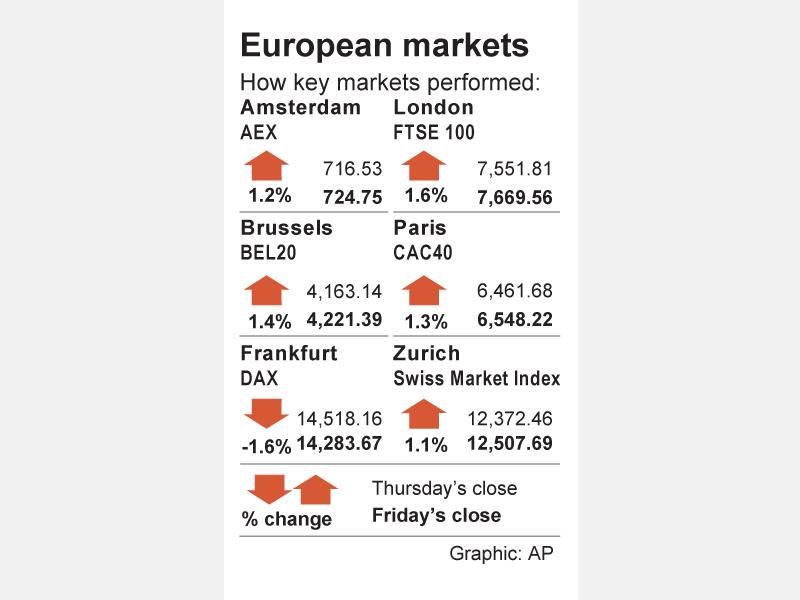European shares on Friday rallied to erase weekly losses, while investors focused on a tight race between far-right candidate Marine Le Pen and French President Emmanuel Macron in the run-up to the first round of presidential elections over the weekend.
Financials and commodity stocks led the gains, with all major sectors in positive territory. The pan-European STOXX 600 index gained 1.31 percent to 460.97and ended the week 0.57 percent higher, with healthcare stocks firming the most on the week.
Topping the index was Banco BPM’s 10.2 percent surge, after French bank Credit Agricole said it has bought a 9.2 percent stake in Italy’s third-largest bank.

“European markets are mostly playing catch-up with the US from yesterday’s close,” Barclays Private Bank chief market strategist Julien Lafargue said, adding that investors are waiting to get a sense of what earnings could look like when big US banks open next week.
“Traders have shrugged off the negative headlines about additional sanctions on Russia, as well as the chatter about higher interest rates from the Fed, but by and large, it was a negative week for equities, as countries revealed plans to target Russia’s energy exports,” Equiti Capital market analyst David Madden said.
The EU on Friday formally adopted its fifth package of sanctions against Russia, including bans on imports of coal, wood, chemicals and other products.
Despite a 12 percent recovery from one-year lows hit last month, the STOXX 600 index is still down more than 6 percent so far this year on worries that surging inflation due to the Ukraine war might trigger central bank moves that could squeeze growth.
In today’s first round of elections in France, center-left Macron is seen winning, butLe Pen has surged in polls in the past few weeks, leaving her victory within the margins of error.
The two leading candidates from the vote are to head to a run-off on April 24.
Despite the polls, the turnout or lack thereof could swing the election, Lafargue said.
France’s CAC 40 index rose 1.34 percent to 6,548.22, but is down 2.04 percent this week — the most among its European peers — on election uncertainty.
In London, the FTSE 100 closed at an eight-week high, lifted by commodity and banking stocks.
The index gained 1.56 percent to 7,669.56, up 1.75 percent from a week earlier — its highest since Feb. 11 — with oil majors BP PLC, Shell PLC and miner Anglo American PLC rising 3.7 to 4.8 percent.
“The make-up of the FTSE 100 is the biggest reason why the market is outperforming,” said Maarten Geerdink, head of European equities at NN Investment Partners.
“We’ve a very different landscape for commodities at this time ... and the natural reaction from equity investors is if you want to hedge yourself against inflation, you want to buy into commodity exposure,” Geerdink said.
The FTSE 100 is up 3.7 percent so far this year due to its heavy weighting in energy and mining companies, which have benefited from a sharp rally in oil and metal prices.
Defensive sectors such as pharmaceuticals and utilities boosted markets this week as investors played it safe amid concerns about the war in Ukraine and prospects of rapid policy tightening by global central banks to tame inflation.

SEEKING CLARITY: Washington should not adopt measures that create uncertainties for ‘existing semiconductor investments,’ TSMC said referring to its US$165 billion in the US Taiwan Semiconductor Manufacturing Co (TSMC, 台積電) told the US that any future tariffs on Taiwanese semiconductors could reduce demand for chips and derail its pledge to increase its investment in Arizona. “New import restrictions could jeopardize current US leadership in the competitive technology industry and create uncertainties for many committed semiconductor capital projects in the US, including TSMC Arizona’s significant investment plan in Phoenix,” the chipmaker wrote in a letter to the US Department of Commerce. TSMC issued the warning in response to a solicitation for comments by the department on a possible tariff on semiconductor imports by US President Donald Trump’s

‘FAILED EXPORT CONTROLS’: Jensen Huang said that Washington should maximize the speed of AI diffusion, because not doing so would give competitors an advantage Nvidia Corp cofounder and chief executive officer Jensen Huang (黃仁勳) yesterday criticized the US government’s restrictions on exports of artificial intelligence (AI) chips to China, saying that the policy was a failure and would only spur China to accelerate AI development. The export controls gave China the spirit, motivation and government support to accelerate AI development, Huang told reporters at the Computex trade show in Taipei. The competition in China is already intense, given its strong software capabilities, extensive technology ecosystems and work efficiency, he said. “All in all, the export controls were a failure. The facts would suggest it,” he said. “The US

The government has launched a three-pronged strategy to attract local and international talent, aiming to position Taiwan as a new global hub following Nvidia Corp’s announcement that it has chosen Taipei as the site of its Taiwan headquarters. Nvidia cofounder and CEO Jensen Huang (黃仁勳) on Monday last week announced during his keynote speech at the Computex trade show in Taipei that the Nvidia Constellation, the company’s planned Taiwan headquarters, would be located in the Beitou-Shilin Technology Park (北投士林科技園區) in Taipei. Huang’s decision to establish a base in Taiwan is “primarily due to Taiwan’s talent pool and its strength in the semiconductor

French President Emmanuel Macron has expressed gratitude to Hon Hai Precision Industry Co (鴻海精密) for its plan to invest approximately 250 million euros (US$278 million) in a joint venture in France focused on the semiconductor and space industries. On his official X account on Tuesday, Macron thanked Hon Hai, also known globally as Foxconn Technology Group (富士康科技集團), for its investment projects announced at Choose France, a flagship economic summit held on Monday to attract foreign investment. In the post, Macron included a GIF displaying the national flag of the Republic of China (Taiwan), as he did for other foreign investors, including China-based